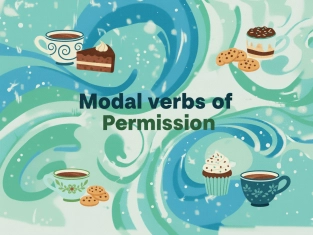Modal Verbs of Obligation
Table of Contents
Exercises
Explanation
The main modal verbs of obligation are must, should, and have to. We can also use need to and ought to in some situations.
1. Should – advice or recommendation
Should is used to give advice or suggest the best action in a friendly, non-forceful way. It does not express strong obligation; the listener has a choice.
Examples:
-
You should drink more water during the day.
-
He should talk to his teacher if he needs help.
Forms:
-
Affirmative: subject + should + verb
-
Negative: subject + should not (shouldn’t) + verb
-
Questions: Should + subject + verb?
2. Must – strong personal obligation or necessity
Must expresses a strong need to do something. The obligation often comes from the speaker’s own feelings, beliefs, or decisions. It can also express emotional advice or a strong recommendation.
Examples:
-
I must finish this assignment tonight; it’s very important to me.
-
You must try this new café—it’s amazing!
In the negative form, must not (mustn’t) means prohibition—something is not allowed.
Examples:
-
You mustn’t touch the wires. It’s dangerous.
-
Students mustn’t use their phones during the exam.
Forms:
-
Affirmative: subject + must + verb
-
Negative: subject + must not + verb
-
Questions: Must + subject + verb?
3. Have to – obligation from rules or circumstances
Have to expresses a duty or requirement that comes from outside, such as laws, rules, schedules, or other people’s expectations. It is not based on the speaker’s personal feelings.
Examples:
-
Employees have to show an ID card at the entrance.
-
Lisa had to stay late yesterday because her boss needed help.
Important: don’t have to means something is not necessary—you can do it, but you don’t need to.
Examples:
-
You don’t have to bring your own laptop; we have one for you.
-
He doesn’t have to get up early tomorrow.
Forms:
-
I/you/we/they: have to / don’t have to
-
He/she/it: has to / doesn’t have to
-
Questions: Do/Does + subject + have to + verb?
4. Need to – practical necessity
Need to shows that something is necessary because of the situation or common sense. It is less strong than must and often sounds more neutral.
Examples:
-
We need to leave soon if we want to catch the train.
-
She needs to check the weather before planning the trip.
Forms:
-
need to / don’t need to
-
needs to / doesn’t need to
-
Do/Does + subject + need to…?
5. Ought to – moral duty or polite advice
Ought to has a similar meaning to should, but it sounds more formal and is not used as often in modern spoken English.
Examples:
-
You ought to show more evidence in your presentation.
-
People ought to be respectful in public places.
Forms:
-
Affirmative: subject + ought to + verb
-
Negative: subject + ought not to + verb
-
Questions: Ought + subject + to + verb?
6. Quick Comparison
|
Modal Verb |
Type of Obligation |
Example |
|
must |
strong internal need / rules |
I must focus more. |
|
have to |
external rules or requirements |
We have to wear safety helmets. |
|
should |
advice or recommendation |
You should take a break. |
|
need to |
practical necessity |
They need to book the tickets soon. |
|
ought to |
moral or formal advice |
He ought to follow the doctor’s instructions. |
Understanding these modal verbs will help you talk about rules, give advice politely, and explain responsibilities clearly. They are essential for communication in school, work, travel, and daily life.

